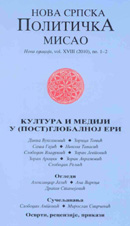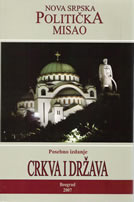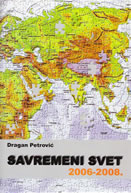| NSPM in English | |||
Our Vanities are Stronger Than Our Ideas |
 |
 |
 |
| петак, 10. октобар 2008. | |
|
(Interview originally published in journal Geopolitika, No. 28, September 25th, 2008, pp. 6-8, and translated by De-Construct.net (http://de-construct.net/e-zine/?p=3088)) SA: The rifts in our political parties are usually caused by the fact our vanities are stronger than the ideas. Current elite, especially the political one, had turned out to be a club comprised of strong vanities and weak ideas. There are more struggles there than activities right now. This latest rift could only have happened because of the lack of the well built democratic structures within the political parties, which continue to be owned by their leaders. SA: SRS was the strongest parliamentary part for the long time, also exemplifying the serious Euroscepticism. That created certain balance in our parliamentary life, in juxtaposition to [Tadic's] DS [Democratic Party], as a major Euro-Atlantic party. However, after this clash, that balance has vanished. We will now have a big and strong EU/reformist party on the one side, and a number of small and weak sovereignty parties on the other. This is a very serious blow for the entire national option in Serbia. SA: That is another significant phenomenon we can observe in our society. There is a great difference between the social elite, not only economical and political, but also cultural, academic, media… on the one side, and the common citizens, on the other. Our elite is mostly pro-Euro-Atlantic, but our citizens, and that was shown in these elections as well, are mostly pro-national. The fact that the sovereignty parties are not in power today is only a consequence of the treason on behalf of the part of national elite, which entered the elections with the sovereignty program and then formed the government with the Euro-Atlantic parties. But there is still a big gap between the elite and citizens, in the way community is viewed, and in the basic values. This gap is now deepened by the betrayal, a ‘conversion’ of the part of our national elite. SA: The weakness of the national forces is more important in this case. Our national elite has made a whole score of mistakes in the past two years. For example, when Kosovo was declared independent on February 17, a powerful national energy was awakened. Nation has shown huge dissatisfaction. But this awakened energy has been used badly — it was simply left to evaporate, instead of being used to form the Government of the National Salvation, which would affirm the essential national and patriotic values. Only after such renaissance of the national idea — and there were three-years-time for it — should have there been elections, in far more favorable media and institutional conditions. Instead, our national forces have done everything wrong. They have misjudged the situation, they chose the bad moment to go to elections, they ran their campaigns badly… Finally, they even failed to materialize the minimal advantage they gained at the elections. That is why we are now in the midst of a great national crisis — not only the crisis of the national political parties or of the national elite, this is the crisis of the entire national idea, or rather of its present form. In that sense, we should say we are at the same place we were at in the year 2000. The form of the national idea back then, the state nationalism, was exhausted. Serbia, as a state, had withdrawn before the NATO pact forces, and our economy, due to the EU and US’ blockade, was on its knees. On the other hand, the sovereign national political parties, which are in opposition right now, are in the deepest crisis. This is the crisis of both ideas and people. It was shown once again that there can be no strong national politics without the strong cultural, academic and media national elite. So, the Serbian national political elite, without the strong cultural elites, had to be defeated this year, in 2008. I could wager that, symbolically, the first indicator of such anti-Serbian cultural colonialism will be the systematic expulsion of the Cyrillic alphabet. While we were treating it with the typical Serbian nonchalance and carelessness, this alphabet of our forefathers was precisely the thing our enemies have recognized as the key symbol of Serbian national identity. I am convinced that the expulsion of Cyrillic alphabet will be fashioned after the aforementioned Belgrade model. In Belgrade the Cyrillic as, presumably, insufficiently “urban” and “European”, has been systematically expelled, starting with the city television, through the town newspapers, down to the town institutions. Similar process is at the moment being completed in Vojvodina. Now, this model of “europeization” of Serbia will undoubtedly be applied throughout the state. Serbia will be systematically “freed” of its Serbian national identity, and exactly through the Serbian institution and on the account of Serbian tax payers. But if our institutions are being possessed, hopefully our brains are not. That is where we have to enact a revolution. We have to recognize the things that are important today and to, at least symbolically, resist. I was also writing in the Latin alphabet and accepting to have my books printed in Latin alphabet — I thought it’s the same thing. But when I saw how much the militants from the “Helsinki Charter”, “Pescanik” or B92 hate Cyrillic, I realized it isn’t exactly the same thing. We must, at least in that part, and as much as we can, offer resistance. That individual resistance, the resistance by ourselves and by our friends, from various walks of life, is all we have left right now… until the better times come. SA: Systematic work is much more important. It has to be based upon the individual efforts of the writers, artists, intellectuals… In our studios, at our writing desks, in our work space, we have to create something new and good, something which manifests in the best way the spirit of freedom and rebellion. Because all of us are individually rebels against the system of lies and violence, against the system which was probably never stronger and more cunning. Our creations are our flags of resistance. And the more beautiful they are, the bigger they are, more free people might gather around them. On the other hand, all of those pockets of resistance must get connected, networked. We must forget our vanities, personal and guild clashes, and give preeminence to the common, supra-personal. If we fail to achieve that, we may as well close our master craftsman workshops. Because, they will soon be in such a spiritual desert that the things we do won’t interest anyone any longer. SA: I believe the idea of creating a parallel state structure in the province of Vojvodina is lethal. That is practically a new state on Serbian territory. We shall from now on have three states — one with the center in Belgrade, the other with the center in Novi Sad [Vojvodina province] and the third part of the state which is occupied. This is significantly accelerating the process of creating some kind of new, “Vojvodina identity”. Its best announcement is the book by the Helsinki Committee with the same title: “Vojvodina identity”. The idea is to create the elite in Novi Sad which will basically have no contact with Belgrade, and that is what is currently being realized through the Statute. From now on, you will be able to make the entire political career, even to go abroad as a “diplomatic representative of Vojvodina”, without ever coming to Belgrade. Once you get the institutionally and psychologically separated elite, as it happened with Montenegro, you will quickly get the separate identity and, in the end, the separate state. Thanks to its own stupidity and even treachery, Serbian elite is on its way of losing Vojvodina province too. SA: Economically, politically or militarily West was never more powerful. Its military, economic and media structures were never stronger. On the other hand, West was never weaker when it comes to ideas. And the structures are based on the ideas. Тhat is why Kosovo province, in the sense of the world history, was a decisive issue — it has stripped these structures bare naked. It has shown that the main idea the West is based on is the right of the might. Kosovo has shown there are no norms — ethical, legal, political, on which the world order rests. There is only the right of the might, which ensues from the power of weapons, money and media: that is the essence of the Western world. But those mighty structures are, in fact, frail. There is only violence, corruption and manipulation standing behind them. And, as we know, there is no enduring Empire that is erected upon the sword, silver coins and lies. That is why the main enemy of these structures today is Islam. Not because of the Islamic terrorism, weapons or the terrorist attacks, but because Islam has an idea about the alternative values, about the alternative way of life. Because Muslims, even when they are in the West, live that idea, testifying its strength and vitality. Russia also became enemy of the West because that country, which was already broken down, renewed itself precisely thanks to the idea. China is not the Western enemy, because there is no alternative idea right now behind that strong state. In the eyes of the West, China today is only a primitive Japan, while Japan itself is nothing more than the American corporate idea applied onto a nation. Indeed, the American criteria of a material success is today equally characteristic both for the spirit of China and Japan. The fact they are economically competing with the US is not the problem, the problem is that there is nothing behind that competition. If China ever catches up to the US, it will become an Asian America. And what then? But, behind Russia there is an idea of an essentially different world, the idea of otherness. That is the idea that spiritual is equally important as the material. Everybody says that, but very few actually believe it. And Russia knows that, regardless how far above Russia the US is materially, spiritually Russia and the US are equal. Russia did not stand up and stood face-to-face with the US because it caught up with the US economically, but because it believes that, as a nation, it is equally valuable and important as the United Stats. Russian ascent is rooted in that spirit, and not in the price of oil. It is this spirit of equality, dignity, uprightness that is fundamentally subversive for the globalist structures, which are based on the hierarchy of power, on the division between the elite and slaves, on the belief the misery that befell the slaves is the slaves’ fault, because they do not resemble their masters enough. This same spirit of authenticity, equality, dignity lives in the Serbian national idea too. That is why it is so dangerous to the globalist structures and why so many hate it with such passion, both among the globalism elite and its local servants. Serbian national idea, at least as we knew it by now, has proved to be irreconcilable with the spirit of slavery. For this reason, our enslavement will be finalized only when that idea gets irretrievably destroyed. |
Остали чланци у рубрици
- Playing With Fire in Ukraine
- Kosovo as a res extra commercium and the alchemy of colonization
- The Balkans XX years after NATO aggression: the case of the Republic of Srpska – past, present and future
- Из архиве - Remarks Before the Foreign Affairs Committee of the European Parliament
- Dysfunction in the Balkans - Can the Post-Yugoslav Settlement Survive?
- Serbia’s latest would-be savior is a modernizer, a strongman - or both
- Why the Ukraine Crisis Is the West’s Fault
- The Ghosts of World War I Circle over Ukraine
- Nato's action plan in Ukraine is right out of Dr Strangelove
- Why Yanukovych Said No to Europe

.jpg)








 Q: Serbian media and the entire public has been absorbed by the rift in Serbian Radical Party [SRS]. What was the essential cause of that split — is it ideological and political, an issue of cadres, the fact party was in the opposition for a long time… ?
Q: Serbian media and the entire public has been absorbed by the rift in Serbian Radical Party [SRS]. What was the essential cause of that split — is it ideological and political, an issue of cadres, the fact party was in the opposition for a long time… ?










